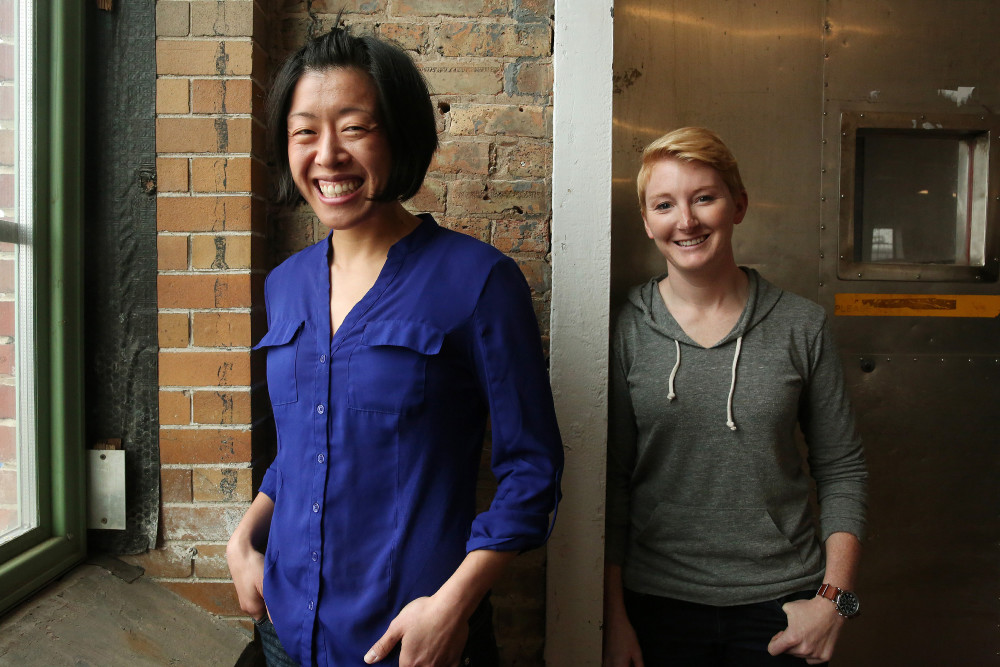By Greg Trotter
Chicago Tribune
WWR Article Summary (tl;dr) Two female army vets who proudly served in Afghanistan are now serving up hope to the Afghan people. Their company, “Rumi Spice” sources its saffron in western Afghanistan which is then shipped to Chicago for cleaning and packaging before heading to restaurants in Chicago and New York. I am so excited for this company…these Women in Business ROCK!
CHICAGO
A saffron dream that first took root in Afghanistan is now growing on Chicago’s South Side, where two Army veterans are carrying out what they consider to be “unfinished business.”
In 2011, Emily Miller performed night raids in Afghanistan as part of a “cultural support team” that sought valuable information on terrorists from women and children. Miles away, Kimberly Jung, Miller’s best friend and fellow West Point grad, was leading a platoon searching for roadside bombs.
Both women left the war-ravaged country feeling like more needed to be done.
“I realized the military had a fundamentally vital role to play there in establishing security and stability, but I also realized we lacked a long-term commitment to the people in the form of economic empowerment and business,” said Miller, a 29-year-old Indiana native.
From such revelations came Rumi Spice, a small business with big hopes of helping Afghan people through economic partnership. Delicate saffron threads, handpicked from crocus flowers in the western Afghanistan province of Herat, are dried and shipped to an old meatpacking plant in Chicago, where they are then inspected, cleaned and packaged for restaurants in Chicago and New York.
Since the business formed in 2014, the number of farmers selling saffron to Rumi Spice has more than tripled to 34, Jung said.
Sales are expected to hit $500,000 this year, up from $130,000 in revenue last year, she said, though the company is not yet profitable.
Rumi is preparing to expand into retail by 2017 with plans to roll out new products, including teas, spice blends and skin care products.
“We make it very clear that this is not a charity. All we’re doing is opening up markets of saffron for these Afghan farmers,” said Jung, a 29-year-old Los Angeles native who serves as CEO of Rumi Spice. “A very simple buying-selling economic partnership is sometimes the most strong.”
As the two women neared the end of their respective five-year stints in the Army, they made plans for their next mission: civilian life. In the wee hours of morning in 2011, from the Bagram Airfield, Miller called Jung on the phone.
“I was like, dude, what are you going to do?” recalled Miller, now chief operating officer for Rumi Spice.
Jung’s answer for both of them: Harvard Business School. Both women were accepted into the school in 2013 and started Rumi Spice, named after the 13th-century poet born in what is now Afghanistan, the next year with co-founders Keith Alaniz, another Army veteran, and Carol Wang, both of whom still work for Rumi Spice part time.
Afghanistan is better known for growing opium poppies than saffron, though some slow progress has been made in changing that reality. In December, a United Nations report noted that last year brought the first decrease in land used for poppy cultivation since 2009, from 516,450 acres in 2014 to 452,203 acres last year.
In recent years, both the Afghanistan and U.S. governments, as well as various nongovernmental organizations, have pushed saffron farming as a safer and more lucrative alternative for farmers.
Saffron is very expensive, in large part because of the painstaking labor involved in harvesting the threads by hand. Rumi Spice charges about $109 for an ounce of saffron, Jung said. But a little bit of the product goes a long way in cooking, she said, and the spice is used in dishes spanning various cultural traditions, including Italian risotto, Spanish paella, Indian desserts and tea.
At Naha, a Michelin-rated restaurant in Chicago, Chef Carrie Nahabedian uses Rumi Spice saffron in her lacquered aged moulard duck breast, a dish also featuring foie gras, rhubarb and lime. The saffron makes the dish more vibrant in color and flavor, Nahabedian said.
Nahabedian said she admired the social mission aspect of Rumi Spice and valued the quality of the product enough to feature it on her menu. She also keeps a small vial of the saffron on her desk to occasionally smell its complex floral fragrance.
Not everyone’s going to like the idea of supporting Afghanistan through economic partnership, though, Nahabedian said.
“Some people might like the story. Some others might have known someone who was hurt or killed over there and think ‘What do I care about that country?'” Nahabedian said. “They’re on a slippery slope that way.”
Jung and Miller are keenly aware their personal stories will be critical in overcoming such hurdles and marketing their products.
“I think Afghanistan holds a special place in a lot of people’s hearts. Some of it in a bad way. We want to change that dynamic,” Jung said.
On a recent afternoon, the two women hustled between meetings with brand marketing consultants and an interview with a reporter, after a morning of packing saffron. Their office had the look of any other busy startup, strewn with cartons of Chinese food and laptops splayed open. It just smelled better.
Jung and Miller said they’re proud of what they’ve accomplished so far, particularly the hiring of dozens of Afghan women for the harvesting of the saffron. But they still have work to do.
“It’s one step at a time,” Jung said. “There’s an Afghan saying … a river is made drop by drop.”














































































































































































































































































































































































